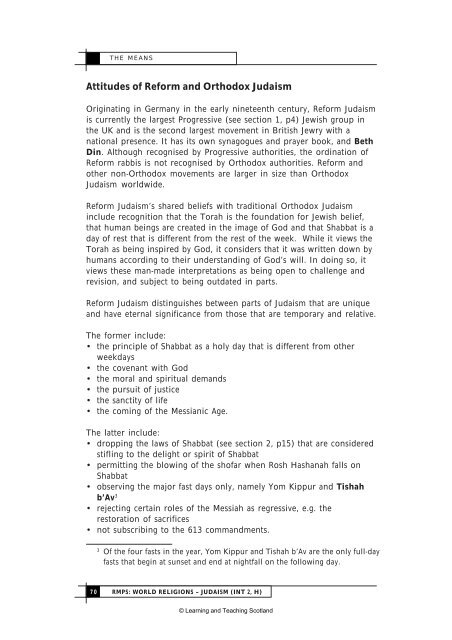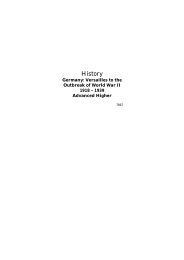RMPS - Int2/Higher - World Religions - Judaism - Education Scotland
RMPS - Int2/Higher - World Religions - Judaism - Education Scotland
RMPS - Int2/Higher - World Religions - Judaism - Education Scotland
You also want an ePaper? Increase the reach of your titles
YUMPU automatically turns print PDFs into web optimized ePapers that Google loves.
THE MEANS<br />
Attitudes of Reform and Orthodox <strong>Judaism</strong><br />
Originating in Germany in the early nineteenth century, Reform <strong>Judaism</strong><br />
is currently the largest Progressive (see section 1, p4) Jewish group in<br />
the UK and is the second largest movement in British Jewry with a<br />
national presence. It has its own synagogues and prayer book, and Beth<br />
Din. Although recognised by Progressive authorities, the ordination of<br />
Reform rabbis is not recognised by Orthodox authorities. Reform and<br />
other non-Orthodox movements are larger in size than Orthodox<br />
<strong>Judaism</strong> worldwide.<br />
Reform <strong>Judaism</strong>’s shared beliefs with traditional Orthodox <strong>Judaism</strong><br />
include recognition that the Torah is the foundation for Jewish belief,<br />
that human beings are created in the image of God and that Shabbat is a<br />
day of rest that is different from the rest of the week. While it views the<br />
Torah as being inspired by God, it considers that it was written down by<br />
humans according to their understanding of God’s will. In doing so, it<br />
views these man-made interpretations as being open to challenge and<br />
revision, and subject to being outdated in parts.<br />
Reform <strong>Judaism</strong> distinguishes between parts of <strong>Judaism</strong> that are unique<br />
and have eternal significance from those that are temporary and relative.<br />
The former include:<br />
• the principle of Shabbat as a holy day that is different from other<br />
weekdays<br />
• the covenant with God<br />
• the moral and spiritual demands<br />
• the pursuit of justice<br />
• the sanctity of life<br />
• the coming of the Messianic Age.<br />
The latter include:<br />
• dropping the laws of Shabbat (see section 2, p15) that are considered<br />
stifling to the delight or spirit of Shabbat<br />
• permitting the blowing of the shofar when Rosh Hashanah falls on<br />
Shabbat<br />
• observing the major fast days only, namely Yom Kippur and Tishah<br />
b’Av 3<br />
• rejecting certain roles of the Messiah as regressive, e.g. the<br />
restoration of sacrifices<br />
• not subscribing to the 613 commandments.<br />
70<br />
3 Of the four fasts in the year, Yom Kippur and Tishah b’Av are the only full-day<br />
fasts that begin at sunset and end at nightfall on the following day.<br />
<strong>RMPS</strong>: WORLD RELIGIONS – JUDAISM (INT 2, H)<br />
© Learning and Teaching <strong>Scotland</strong>
















